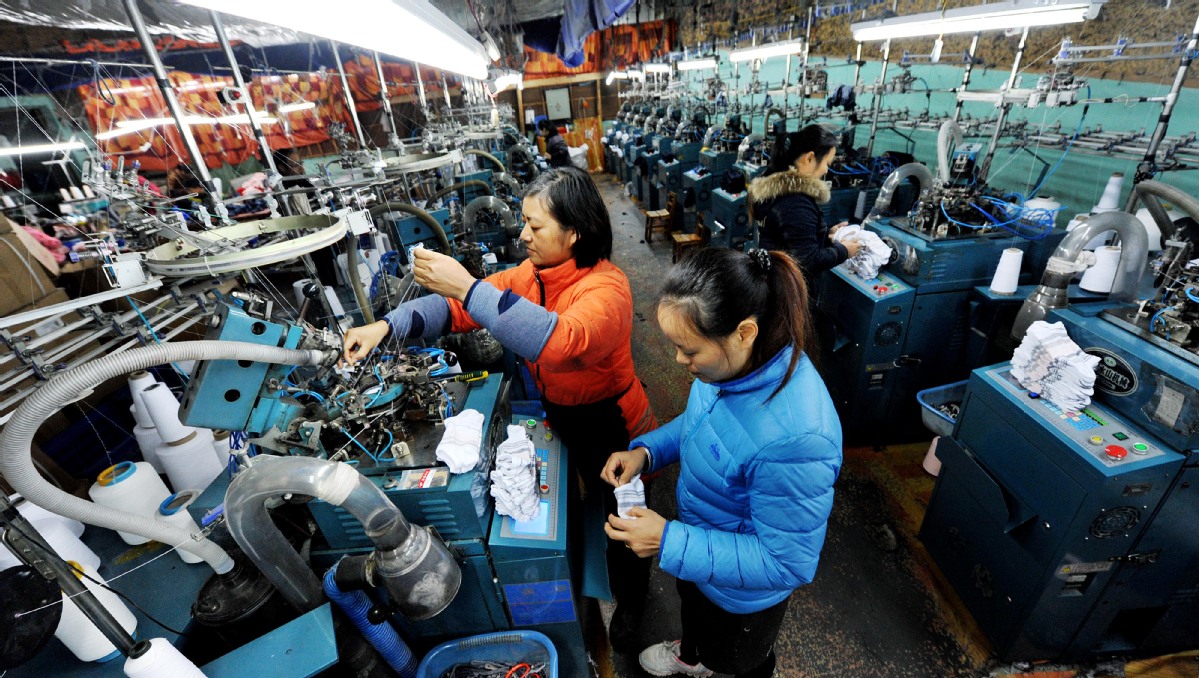Hidden magic of county-level economies
By Zhong Nan | China Daily | Updated: 2019-12-09 08:12

Reform, opening-up transform hinterland, benefiting China and the rest of the world
Though it is almost dinner time, Guanyun Midnight Charm Garment Co's warehouse in Guanyun county of East China's Jiangsu province is a beehive of activity. Workers busily print delivery waybills, stuff sensual underwear and various lingerie products into boxes, prepare parcels for dispatch...
The address labels on some parcels bound for the domestic market state the contents inside are garments (or household articles). This is to protect the privacy of the consumers concerned, besides making it easier for both courier firms and their deliverymen to sort various items.
Many parcels are bound for overseas markets as well. Guanyun county's overall daily delivery volume is around 20 million parcels, mainly to countries such as Japan, South Korea, Thailand, the United States, and many others in the European and Middle East Markets.
Once a poor county located in the northern part of Jiangsu province, Guanyun is home to residents and even government leaders who were either shy or reluctant to talk about their popular business a decade ago. Lingerie manufacturing today has replaced agriculture to become the county's pillar industry. It supports over 20,000 jobs for the local community.
Lu Xijuan, director of the e-commerce office at Guanyun county's commerce bureau, said the boom has not only created over 500 lingerie factories with 2 billion yuan ($284 million) in sales revenue last year and 3,045 online shops on Taobao, an e-commerce platform owned by Alibaba Group, but attracted the county's migrant workers back to their hometown to join the business.
This is just one example of how China's reform and opening-up has created a positive impact on not just urban areas but counties and rural areas. Why, even the global supply chain has benefited a lot, said market analysts.
In addition to China's status as the only country in the world to get all the industrial categories listed in the United Nations industrial classification, many unknown areas of China's factory business are hidden in its counties. A large number of China's small and medium-sized enterprises are operating in these areas with various characteristics, said Li Zibin, chairman of the China Association of Small and Medium Enterprises, which is based in Beijing.
"Even though the GDP of many county-level economies is relatively small, they produce a variety of products and they have worldwide influence," he said, noting if one county shuts down its factories, supply shortages may rock the global markets.
A growing number of Chinese counties have emerged as the capital of various goods in the world. For example, Shaodong county of Hunan province exported over 5 billion lighters to global markets last year. Zhuji and Shengzhou, two county-level cities in Zhejiang province, are major suppliers of socks and ties respectively to the world markets.
"Despite many counties not having advantages like natural resources, their compact industrial structures and typical acquaintances across the society are key to the formation of industrial clusters," said Qiao Runling, deputy director of the China Center for Urban Development, which is a part of the National Development and Reform Commission.
Qiao said as long as there is a person or a business to find the road to get prosperous, an entire county or town may decide to tread a brand new economic track.
By the end of 2018, the number of SMEs surpassed 30 million and the number of self-employed industrial and commercial households exceeded 70 million in China, data from the Ministry of Industry and Information Technology showed in September.
These contributed over 50 percent of the country's tax revenue, over 60 percent of the GDP, over 70 percent of technological innovations and more than 80 percent of labor force employment.
Eager to compete with its rivals in Guangdong province in the area of lingerie manufacturing, Guanyun county plans to invest 3.25 billion yuan to build a new industrial zone in its eastern part over the next three years. It has set a goal of creating 80,000 jobs and 5 billion yuan in annual sales revenue in the long run.
Currently, about half of its lingerie products are shipped to the US, according to Lu from Guanyun's commerce bureau. He said unlike Chinese consumers, manufacturers found that the consumers in the US prefer to have lingerie with bright colors and flashy styles.
























